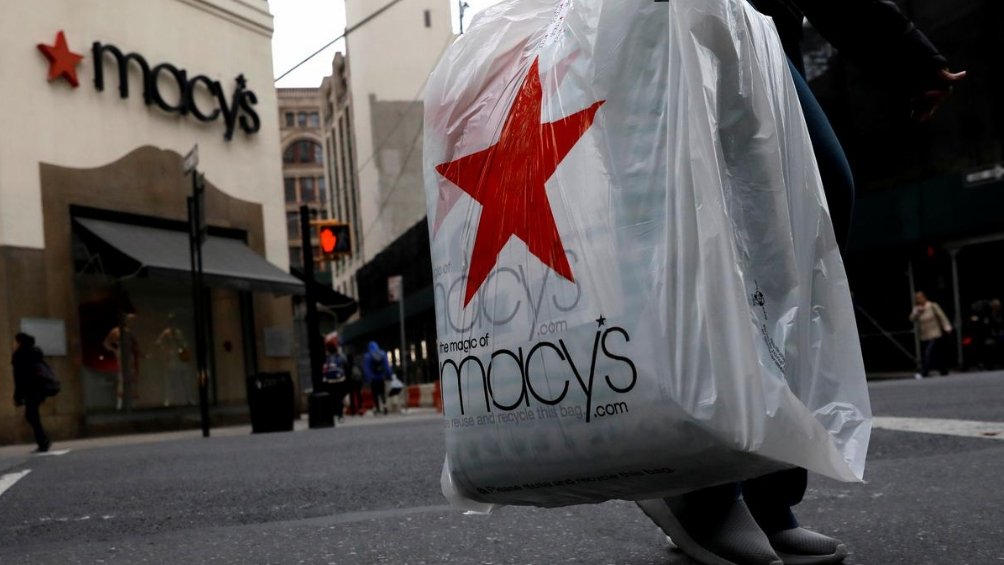
Economy
20:18, 16-May-2019
Macy's CEO says tariff escalation could hurt business
CGTN

Macy's Inc said on Wednesday the latest tariffs on Chinese imports by Washington are hitting its furniture business and warned investors that additional levies would leave its clothing and accessory categories vulnerable as well.
The largest U.S. department store operator is one of the first to comment publicly on the damage that U.S. President Donald Trump imposing tariffs on all remaining imports from China, another 300 billion U.S. dollars worth of goods, could have on business.
In Macy's case, the potential tariffs would impact both its private and national brands, Gennette said.
Gennette said any escalation of tit-for-tat tariffs was not factored into the company's annual outlook and that the company would do what it could to minimize the effect on customers.
The executive said the company had worked hard to reduce reliance on Chinese suppliers.
Washington dramatically escalated its 10-month trade war with Beijing on Friday by raising levies on 200 billion U.S. dollars of Chinese goods in the midst of trade talks, and U.S. President Donald Trump has threatened new tariffs on all remaining U.S. imports from China, sending global financial markets into a tailspin.
Q1 results top expectations
Macy's topped Wall Street estimates for quarterly same-store sales and profit benefiting from increased online sales and higher demand for items sold at its off-price stores.
Macy's shares, which have so far lost more than a quarter of their value this year, were down less than 1 percent at 21.61 U.S. dollars in afternoon trading.

Reuters Photo
Reuters Photo
Like its peers, the Cincinnati, Ohio-based department store chain, which has closed more than 100 stores since 2015 and cut thousands of jobs as mall traffic plummeted, faltered in the past few years as it struggled to adjust to a fiercely competitive retail landscape where shoppers buy more goods online at places like Amazon.com Inc.
The 160-year-old retailer has poured money into building up its private label clothing as well as expand its off-price venture, Backstage, by adding 45 more stores this year.
Gennette said brick-and-mortar sales trends improved sequentially in the first quarter, helped by its off-price Backstage business. The retailer said it saw double-digit growth in its digital business and that mobile continues to be Macy's fastest-growing channel for sales growth.
Sales at Macy's stores open more than 12 months, including sales in department stores licensed to third parties, rose for the sixth straight quarter. They were up 0.7 percent, above the average analyst estimate of a 0.3 percent rise, according to research firm Consensus Metrix.
Gross margin in the quarter fell to 38.2 percent from 39 percent, because a delayed start to spring bloated inventories. Macy's said it expects to see some gross margin pressure in the second quarter as it continues to clear excess spring products.
Last quarter, Macy's announced a plan focused on cost cuts for 2019 to speed up decision-making and result in an annual savings of 100 million U.S. dollars.
The company earned 136 million U.S. dollars, or 44 cents per share, in the first quarter ended May 4, compared to 139 million U.S. dollars, or 45 cents per share, a year ago. That exceeded the average analyst estimate of 33 cents.
Net sales fell to 5.50 billion U.S. dollars, roughly in line with analysts expectations, according to IBES data from Refinitiv.
“With comp results coming in better-than-feared, we'd expect a modest relief rally out of Macy's today, but would not be chasing the stock,” Gordon Haskett analyst Chuck Grom said in a note.
The company also repeated its previously issued financial forecast for the year.
Source(s): Reuters

SITEMAP
Copyright © 2018 CGTN. Beijing ICP prepared NO.16065310-3
Copyright © 2018 CGTN. Beijing ICP prepared NO.16065310-3